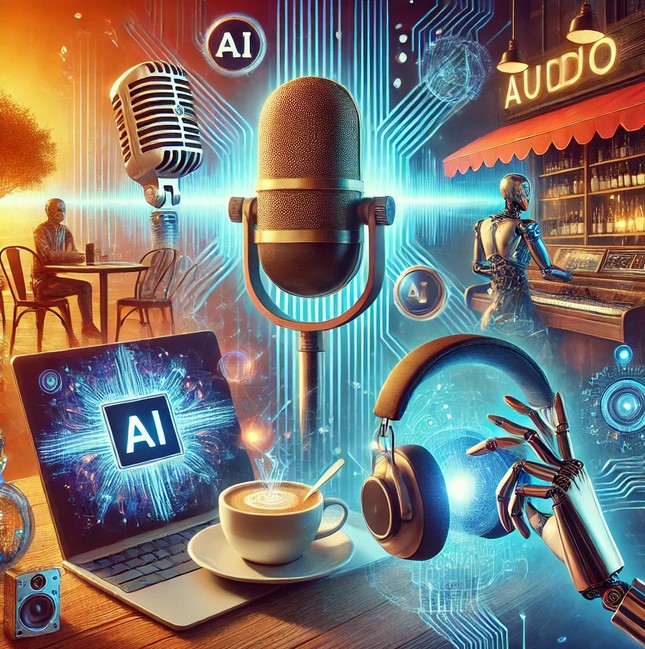SILENCE IS GOLDEN: AI MAKES IT PLATINUM
(ADBE), (SPOT), (CSCO), (SOUN), (NVDA), (MSFT), (GOOGL), (AMZN), (AAPL)
So, a buddy of mine recently kicked off a new podcast and boy! Was I blown away by her slick audio editing skills? I was almost turning green with jealousy until she let me in on her little secret—Descript’s AI-powered editing tool.
All the hullabaloo about AI taking over our lives and reshaping jobs as we know them may have been just much ado about nothing. But, hold your horses before you blow the bubble of hype. I've got a few examples of micro-revolutions sparked by AI that might just change your mind.
Take my friend and her podcast, for example. With the ease of Descript, she breezed through hours of laborious tinkering. This magical tool cuts out all the hums, haws, and time-consuming retakes like a pro. Just a few transcript edits, and the audio's all dressed up, ready to impress.
Adobe (ADBE) is walking the same path with their AI-augmented audio editing software like Adobe Audition and Adobe Podcast Production. Not to be outdone, Spotify's (SPOT) AI tech for podcast recommendations is a godsend, benefiting creators and listeners alike.
Having been on the receiving end of this AI wizardry, I can assure you it's nothing short of transformative. This is especially true for time-consuming tasks like editing long interviews or podcasts.
It's here that AI really proves its mettle, streamlining processes that traditionally took hours into mere minutes.
But audio editing is just the tip of the iceberg. Another revolution I've had the pleasure to experience is AI noise canceling. Picture this: the Audeze Filter, a Bluetooth conference speaker, effortlessly silences even the wails of a baby. It’s like some sort of sorcery.
And it's not just Audeze in this game. Cisco (CSCO) has upped the ante by integrating BabbleLabs' advanced noise cancellation tech into their Webex meetings.
Meanwhile, SoundHound (SOUN) is gearing up to go public with its voice AI technologies, and Veritone is optimizing media content, including audio files, with its robust AI platform.
Actually, I tried out the Audeze tech at a noisy café, and believe me, it turned the place into a peaceful sanctuary at the flip of a switch.
Even NVIDIA (NVDA), usually celebrated for its graphic processing prowess, is making significant inroads into the AI-powered audio processing arena, boosting the capabilities of multimedia applications.
These innovations are what AI should be about — solving real-world problems, not just adding bells and whistles. Yet, despite these advancements, AI has become somewhat of a hype machine, promising a sci-fi future that’s yet to be fully realized.
The Humane AI pin and the Rabbit R1 are glaring examples of failed attempts at selling AI disguised in a hardware package. I mean, who needs more gadgets, right?
Even more concerning is the trend I observed at Computex in Taipei earlier this month, where AI seemed to be shoehorned into familiar gadgets and pitched as the next big thing.
But, let's say, Microsoft (MSFT) rolls out these fancy AI laptops and consumers find them...meh?
I foresee a risk of consumer backlash, like the 3D TVs and VR glasses scenario, if the products don't deliver. And when I pressed an executive about their fallback if AI doesn't boost laptop sales, the prolonged silence was telling.
So, where do we go from here?
I'm with those claiming AI will unleash the creative beast within us and free us to enjoy the fun stuff. But, it's going to be a journey of baby steps, not a giant, ground-breaking leap.
Small but impactful changes like accelerated podcast editing from the likes of Descript, and advanced noise-cancellation tech from Audeze, Cisco, SoundHound, Veritone, and NVIDIA, are where the real micro-revolutions lie.
Heck, even tech giants like Alphabet (GOOGL) through its Google AI division, Amazon (AMZN) through its Alexa and AWS divisions, and Apple (AAPL) with its AI-powered audio processing, are fueling these micro-revolutions, transforming industries bit by bit.

